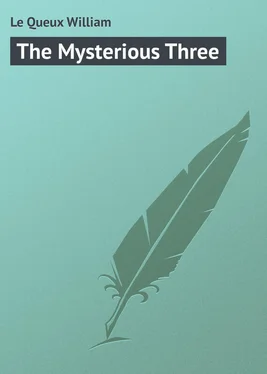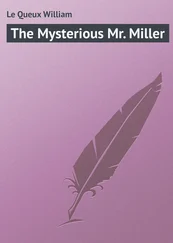William Le Queux - The Mysterious Three
Здесь есть возможность читать онлайн «William Le Queux - The Mysterious Three» — ознакомительный отрывок электронной книги совершенно бесплатно, а после прочтения отрывка купить полную версию. В некоторых случаях можно слушать аудио, скачать через торрент в формате fb2 и присутствует краткое содержание. Жанр: foreign_prose, на английском языке. Описание произведения, (предисловие) а так же отзывы посетителей доступны на портале библиотеки ЛибКат.
- Название:The Mysterious Three
- Автор:
- Жанр:
- Год:неизвестен
- ISBN:нет данных
- Рейтинг книги:5 / 5. Голосов: 1
-
Избранное:Добавить в избранное
- Отзывы:
-
Ваша оценка:
- 100
- 1
- 2
- 3
- 4
- 5
The Mysterious Three: краткое содержание, описание и аннотация
Предлагаем к чтению аннотацию, описание, краткое содержание или предисловие (зависит от того, что написал сам автор книги «The Mysterious Three»). Если вы не нашли необходимую информацию о книге — напишите в комментариях, мы постараемся отыскать её.
The Mysterious Three — читать онлайн ознакомительный отрывок
Ниже представлен текст книги, разбитый по страницам. Система сохранения места последней прочитанной страницы, позволяет с удобством читать онлайн бесплатно книгу «The Mysterious Three», без необходимости каждый раз заново искать на чём Вы остановились. Поставьте закладку, и сможете в любой момент перейти на страницу, на которой закончили чтение.
Интервал:
Закладка:
Le Queux William
The Mysterious Three
Chapter One
Concerns a Visitor
“Do you know a Mr Smithson, Gwen?” Sir Charles Thorold asked his wife abruptly as he stood astride before the big fire in the hall.
“Smithson?” Lady Thorold answered as she poured out the tea. “No. Who is he?”
“I have no idea. Never heard of him.”
Then, addressing the butler, Sir Charles asked anxiously —
“Did he leave a card, James?”
“No, Sir Charles. He asked to see you – or her ladyship.”
“Or me?” Lady Thorold exclaimed. “Why, how very mysterious. What was he like?”
“A tall, powerfully-built man, m’lady.”
“A gentleman?”
“M’yes, m’lady. He came in a car.”
As James said this in his grave, solemn way, I saw Vera Thorold’s eyes twinkle with amusement. For Sir Charles’s only child possessed that gift rare in a woman – a sense of humour.
“You are sure you have the name right?” Thorold said, after a moment’s pause.
“Quite, Sir Charles. I think he was not going to give his name, as you were out. I asked him what name, and he seemed to hesitate, then he said: ‘Oh, say Mr Smithson called, Sir Charles knows me,’ and then he seemed to smile, Sir Charles.”
“He seemed to smile. I wonder why?”
His master turned to Lady Thorold.
“What do you make of it, Gwen?”
“I make nothing of it,” replied his wife. “Is it some friend of yours, Vera?”
“Mother, how ridiculous,” the girl exclaimed; “as if I should have a friend called ‘Smithson’!”
“Pardon me, Sir Charles, but – ” broke in the butler.
“Well, what?”
“There is a portrait of him in the morning-room.”
“A portrait?” gasped his master. “A portrait of Smithson! Then why the deuce didn’t you say so before! Which is it? I should really like to know.”
“There are so many portraits in the morning-room,” Lady Thorold interrupted, “we had better go in, and James will show us which it is. He may have mistaken the name, after all.”
We all got up from tea in the hall, made our way to the drawing-room, and thence into the morning-room, which opened out of it. There was plenty of daylight still. James came in after us, and went straight up to a framed panel portrait which stood with others on a small table in a remote corner. It showed a tall handsome, clean-shaved man of three or four and thirty, of fine physique, seated astride a chair, his arms folded across the back of the chair as he faced the camera.
“This is the one, Sir Charles,” the butler said, pointing to it.
I distinctly saw Lady Thorold give a start. Sir Charles, tanned though his face was by wind and sun, turned quite pale. Vera, who was standing by me at the moment, suddenly gripped my arm, I think unconsciously. As I glanced down at her I noticed that her eyes were set upon her mother. They had in them an expression of deep anxiety, almost of terror. Sir Charles was the first to recover his composure.
“Oh – that one,” he exclaimed slowly, with a forced laugh. “Then there is no mystery at all. His giving the name ‘Smithson’ was of course his joke. Now we know why he smiled. Thank you, James. You can go.”
I confess that I was puzzled. Indeed, I felt greatly mystified, and to some extent perturbed. I knew quite well by my host’s tone and manner and by the look in Lady Thorold’s eyes, perhaps most of all by that squeeze Vera had unconsciously given my arm, that all three had received some very unpleasant, apparently some terrible shock. But why? And what could have caused it? Who was that big man whose portrait stood framed there? What was his name? Why had he called himself “Smithson”? What was the mystery concerning him in relation to my hosts, or the mystery concerning my hosts in relation to him? My curiosity was keenly aroused.
I don’t think I am likely ever to forget that date – Wednesday, February 5, 1911, for it marks the beginning of a train of events so remarkable, I would call it amazing only I am not addicted to talking in superlatives. Yet I do assure you that I in no way exaggerate, and that the story I am about to tell is but a record of bare facts.
That February morning was quite bright and balmy, I remember it because it was the first day of the Waterloo Cup meeting. Rather warm, indeed, for hunting, and at the meet and the coverside the scraps of conversation one overheard referred chiefly to a big ball at Oakham.
Hounds had not been thrown into Colly Weston Wood more than a quarter of an hour when a piercing “View Holloa” echoed through the wood, and a long, lean, yellow-bodied fox broke away not two hundred yards from the spot where the majority of the field sat waiting on their impatient, fidgety mounts, and with a single glance behind him at the mottled pack streaming out of the cover in full cry, crossed a ploughed field, popped through a hedge and disappeared.
A few moments later came the usual wild stampede, and in less than a minute hounds and horses were fast disappearing in the distance, the music of the flying pack growing rapidly fainter in the distance.
By a singular stroke of ill-luck – or so I thought it then – I had got left. I had set my horse at a treacherous stake-and-wattle fence, hoping thus to steal a march on the rest of the field galloping wildly for a couple of open gates. My horse had blundered, I daresay partly through my fault, and had staked himself, though only slightly. To cut a long story short, my day’s amusement was over, for, after doing what I could to staunch the bleeding, I had to lead the poor beast all the way home to Houghton Park, a distance of at least eight miles.
Naturally I expected to be home long before my host, Sir Charles Thorold, and his wife and daughter, for as I entered the Park gates, with my lame animal crawling slowly after me, it was barely three o’clock. I was a good deal surprised, therefore to see Sir Charles and the two coming along another of the Park roads, and not a hundred yards away from me. They had entered by another gate.
“Hello, Ashton!” Thorold called out to me cheerily. “Why, where have you been, and what is amiss?”
I explained as soon as we were all together, and he sympathised. So did Miss Thorold. She was genuinely sorry I had missed the really splendid run.
“We all missed our second horses,” she added, “and our animals were so dead beat that we decided to come home, though hounds were, I believe, going to draw again.”
Her sympathy soothed me a good deal, for I think that even then I was in love with the tall, graceful, fair-haired girl who, on horseback, looked so perfectly bewitching. The exercise, the fresh air and the excitement of the morning’s sport had combined to give a colour to her cheeks and to impart a singular brightness to her eyes that together enhanced her quite exceptional loveliness.
Though I could remember her as a child, I had not seen her for eleven years until a fortnight previously, her father had invited me to Houghton Park, in Rutland. He had invited me the previous year, but on that occasion Vera had been away in Switzerland.
We had got rid of our muddy hunting kit, indulged in hot baths, and, feeling delightfully clean and comfortable and at peace with all the world, were at tea in the great hall of Houghton, a fine, many-gabled country mansion, with rows of twisted chimneys said to date back to a period of Elizabeth, when James the butler, calm and stately – I can see him still – had walked in his slow, dignified manner into the hall, to tell Sir Charles that “a gentleman had called shortly before he returned,” a gentleman named Smithson.
We went back to the big oak-panelled hall to finish our tea, and though Sir Charles and Lady Thorold made light of the incident, and quickly changed the subject of conversation, the entire “atmosphere” seemed somehow different. Our relations appeared suddenly to have become quite strained.
Читать дальшеИнтервал:
Закладка:
Похожие книги на «The Mysterious Three»
Представляем Вашему вниманию похожие книги на «The Mysterious Three» списком для выбора. Мы отобрали схожую по названию и смыслу литературу в надежде предоставить читателям больше вариантов отыскать новые, интересные, ещё непрочитанные произведения.
Обсуждение, отзывы о книге «The Mysterious Three» и просто собственные мнения читателей. Оставьте ваши комментарии, напишите, что Вы думаете о произведении, его смысле или главных героях. Укажите что конкретно понравилось, а что нет, и почему Вы так считаете.












